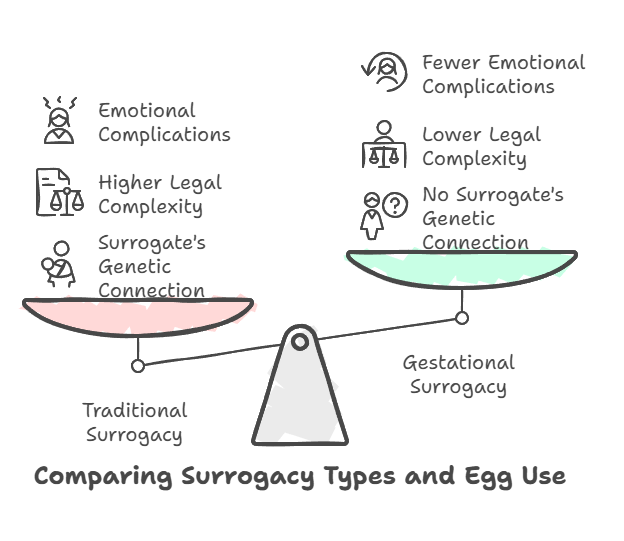Surrogacy is a complex and life-changing decision, often involving many personal, legal, and medical considerations. A common question that arises in the surrogacy journey is: whose egg is used in the process? Understanding this decision is crucial, as it affects the surrogate’s biological connection to the child, the intended parents’ roles, and the overall dynamics of the surrogacy arrangement. In this article, we will break down the different types of surrogacy, who typically provides the egg, and the various factors that influence the choice of egg in the surrogacy process.
1. Two Types of Surrogacy and Their Egg Sources
Before exploring whose egg is used in surrogacy, it’s essential to understand the two main types of surrogacy: traditional surrogacy and gestational surrogacy. Each type has distinct differences in terms of egg use and the surrogate’s role.
Traditional Surrogacy
In traditional surrogacy, the surrogate is also the genetic mother of the child. This is because the surrogate uses her own egg, which is fertilized by the intended father’s sperm (or a sperm donor’s). This means that the surrogate has a biological connection to the child she carries. While traditional surrogacy was more common in the past, it has become less frequent today due to the emotional and legal complexities it introduces. For example, since the surrogate is the biological mother, she may have legal rights over the child, and this can lead to disputes about parental rights and custody.
Gestational Surrogacy
In gestational surrogacy, the surrogate carries a fertilized embryo created via in vitro fertilization (IVF). In this case, the egg is typically not from the surrogate. Instead, the egg comes from either a known egg donor, an anonymous egg donor, or one of the intended parents. Since the surrogate does not contribute genetically to the child, she has no legal claim to the baby, which simplifies the legal process. Gestational surrogacy is far more common today due to its clarity in terms of parental rights and its ability to avoid emotional complications. It is also more frequently used because of advancements in IVF technology.

2. Who Typically Provides the Egg in Gestational Surrogacy?
In gestational surrogacy, the egg is usually provided by one of the following sources:
Anonymous Egg Donor
An anonymous egg donor is someone who donates her eggs through a fertility clinic, and her identity remains unknown to the intended parents. Typically, intended parents will go through an egg donation agency or a fertility clinic that has a database of egg donors. Donors are often chosen based on various factors such as health history, physical characteristics, education, and personal interests. While the donor’s identity is kept confidential, intended parents often receive some information about the donor to help them make their decision. These donors sign legal agreements relinquishing all parental rights over the child. The anonymity of the donor helps avoid emotional and legal complexities but may also create challenges for children born via donor eggs, especially if they wish to learn about their genetic origins later in life.
Known Egg Donor
A known egg donor is someone who has a personal relationship with the intended parents, such as a close friend, family member, or acquaintance. Using a known egg donor has the potential to create a stronger emotional bond between the donor and the intended parents. However, it also adds layers of complexity, as the donor may wish to be involved in the child’s life. For this reason, a legal agreement is crucial to outline the donor’s role, rights, and responsibilities, ensuring clarity around parental rights. Known egg donors are often chosen for their trustworthiness and emotional connection with the intended parents, but it is important to carefully manage expectations to avoid potential conflicts down the road.
One of the Intended Parents (for Lesbian Couples)
For lesbian couples, one partner may choose to provide the egg. In this case, the child will be biologically related to one of the intended mothers. This can be an emotional and fulfilling choice for the couple, as one of them will have a genetic connection to the child. The egg from one mother is fertilized by sperm from the other mother’s partner or a sperm donor. The non-biological mother may then have the option to carry the pregnancy herself or work with a surrogate. This path allows both partners to contribute genetically, which can be an attractive choice for couples seeking a more direct involvement in the child’s creation.

3. How Is the Egg Chosen?
Choosing the right egg is a significant decision in the surrogacy process. Several factors influence how an egg is selected, including health history, physical attributes, and emotional considerations.
Health and Genetic Screening
The health of the egg donor is the most important factor in the selection process. Fertility clinics conduct thorough screening to ensure that the donor is in good physical health, free from genetic disorders, and has a clean medical history. Additionally, many clinics test for common genetic conditions like cystic fibrosis, Tay-Sachs disease, and other hereditary illnesses. Intended parents can request information about the donor’s health to ensure their future child will have the best chances for a healthy life.
Physical and Personality Traits
Some intended parents choose an egg donor based on physical attributes such as eye color, hair color, height, and even ethnicity. While these factors are often not as important as health, some parents feel a deeper connection to a donor who shares similar traits. Donors’ educational background, intelligence, and hobbies may also be taken into consideration. However, it’s important to remember that genetic traits do not solely determine a child’s personality or abilities.
Open vs. Anonymous Donors
When selecting an egg donor, intended parents must decide whether they want an open donation (where the donor’s identity may be disclosed to the child once they reach a certain age) or anonymous donation (where the donor’s identity is never shared). Some parents prefer an anonymous donor to avoid any future emotional complexity or potential legal issues. On the other hand, others may prefer open donation to allow their child to have access to information about their genetic background if they choose to seek it out later in life.

More: How Much Does a Surrogate Cost in Texas? A Complete Breakdown
4. Why Not Use the Surrogate’s Egg?
In some cases, the question arises: why not use the surrogate’s egg in gestational surrogacy? There are several reasons for this decision:
Legal Complications
If a surrogate uses her own egg, she may be considered the child’s biological mother. This can lead to complex legal issues around custody, parental rights, and birth certificates. Intended parents could find themselves in a situation where the surrogate has legal rights over the child, which can result in lengthy court battles.
Emotional Considerations
There is also the emotional aspect to consider. Many intended parents want to establish a clear genetic link to their child. Having a surrogate use her own egg might complicate the emotional connection that the parents feel toward the child. It could also create challenges in terms of how the child views their genetic history and family structure.
Medical Considerations
Using the surrogate’s egg can complicate the medical process, especially if the surrogate is older or has fertility issues. By using a donor egg, fertility specialists can select an egg from a donor with the best chance of success, reducing the risk of complications during the pregnancy.

5. Legal and Ethical Considerations
The process of selecting and using an egg in surrogacy involves significant legal and ethical considerations. Intended parents, surrogates, and egg donors must all sign legal contracts to ensure that parental rights are clearly defined. It is essential to consult with legal experts specializing in reproductive law to avoid any misunderstandings or disputes down the road.
The legal framework for egg donation and surrogacy varies significantly by country and state. Some places have strict regulations, while others have more lenient laws. It is crucial for all parties involved to fully understand the legal implications of the arrangement, including the potential rights of the donor, surrogate, and intended parents.
Conclusion
Choosing whose egg is used in surrogacy is a complex decision that involves legal, medical, and emotional considerations. Whether the egg comes from an anonymous donor, a known donor, or one of the intended parents, it’s essential to understand the implications of each option. Through careful planning, thorough screening, and professional legal guidance, intended parents can make an informed choice that ensures a smooth and successful surrogacy journey.




